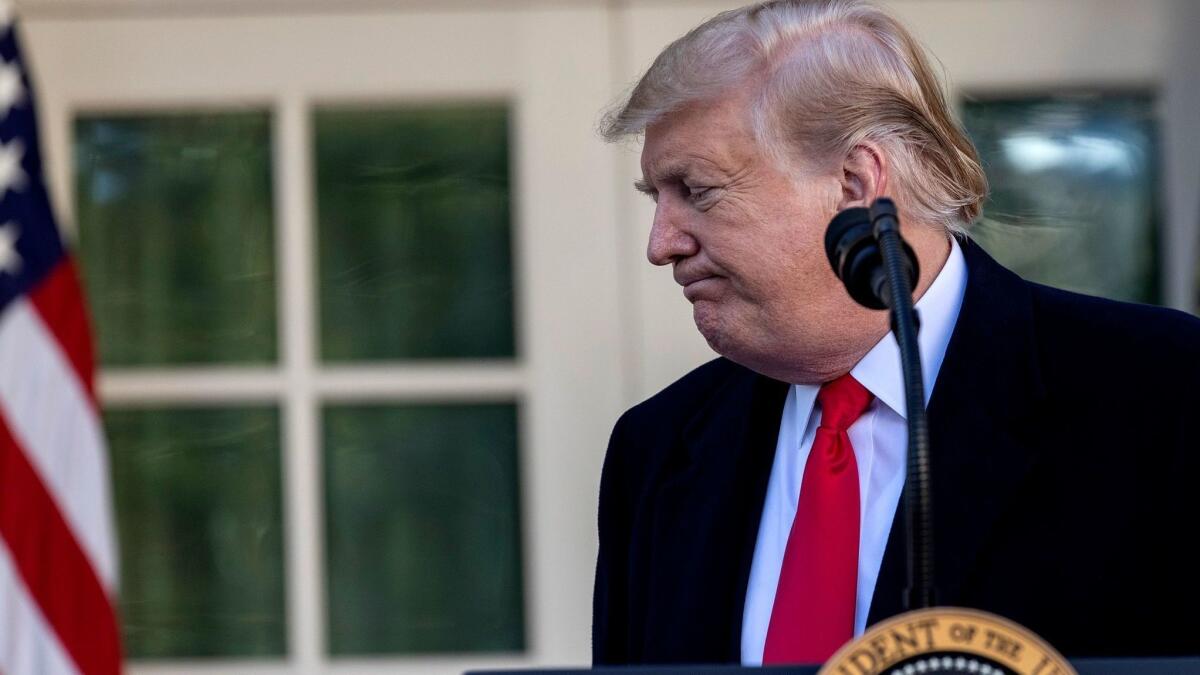How do Democrats negotiate with a president who will build his wall regardless?

- Share via
It’s never easy to tell whether President Trump is staking out a negotiating position or drawing a line in the sand. But the comments he and his acting chief of staff made over the weekend about the border-security negotiations sound like Trump really is dug in on his wall project.
The predictable outcome is that Trump will declare a national emergency and shift money from some other budget items into wall construction. That’s because congressional Democrats have already shown that they simply will not put up the $5.7 billion the president demands for that project.
The possibility of Trump acting unilaterally, though, adds an extra layer of complexity to the bipartisan negotiations going on now over funding for border security. More on that in a second.
Yes, there’s been intransigence on both sides. And yes, a deal seems within easy reach — but only if Democrats could countenance some wall-building in places where it makes sense, and only if Trump could accept that walls wouldn’t do much to solve the manifest problems with U.S immigration policy.
Enter the Fray: First takes on the news of the minute »
Trump appeared to lay the groundwork for such a deal in his speech on Friday, when he emphasized that he was looking for a physical barrier only in high-priority areas specified by border security experts. But his stance hardened almost immediately thereafter, probably in response to all the headlines and commentary about him “caving“ to end the partial government shutdown. Hence the messaging that he was ready to shut down the government again if he doesn’t get the full $5.7 billion for wall construction.
That’s an empty threat. Having seen the damage to his reputation and the economy from the first shutdown, Trump isn’t foolish enough to do it again. (I hope.) As much as he threatens another shutdown if he doesn’t get his way, he has to know it would be political suicide (and toxic to at least some congressional Republicans, as they have no doubt already impressed upon the administration).
But it’s even harder to imagine Trump accepting a deal that looks like the one the Senate crafted last year, which put a lot of money into border security but not the wall. The wall is a pain point for Trump, just as it is for many Democrats who oppose it. So the president seems destined to test the limits of executive power by declaring a national emergency (which he has extremely broad authority to do) and then fund the wall project with money Congress appropriated for something else (which is legally dicier).
What a horrible precedent that would set! Not that Trump, for all his complaints about the Obama administration’s use of executive orders and regulatory authority, has ever worried about pushing the boundaries of presidential power too far.
Plenty of good arguments have been made already about whether such a move by Trump could survive the legal challenge that would be sure to come. At the moment, though, the more interesting question is whether the lawmakers and congressional leaders now negotiating over border-security funds are being played for suckers.
On the one hand, they’re trying to craft a deal on border-security funding that is generous enough to the White House’s position that it wins Trump’s favor. On the other hand, they know that Trump may sign it and then declare an emergency anyway if they don’t give him as much as he wants to spend on the wall.
That’s a tough position to be in if you’re an opponent of the wall. It’s heads Trump wins, tails you lose — unless the courts strike down the president’s rewriting of congressional appropriations. Lower court judges have been willing to rein in this president for playing fast and loose with federal law, but would a Supreme Court dotted with justices who have a permissive view of executive power?
More to Read
A cure for the common opinion
Get thought-provoking perspectives with our weekly newsletter.
You may occasionally receive promotional content from the Los Angeles Times.







